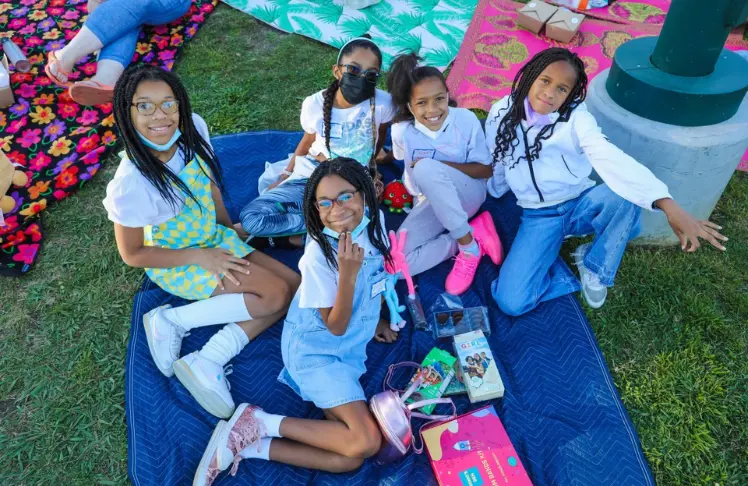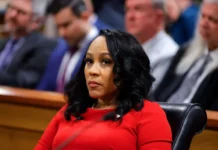

This article is one of a series of articles produced by Word in Black through support provided by the Chan Zuckerberg Initiative. Word In Black is a collaborative of 10 Black-owned media outlets across the country.
by Aziah Siid
In the spring of 2018, Los Angeles two mothers, Kawanna Brown and Lisa Johnson, sparked a transformative movement. Frustrated by the racial isolation their children faced in private schools, they dreamed of a community where Black private school kids could connect and families could support each other.
Johnson, having experienced being one of the few Black students in her Atlanta independent school, was dismayed to find little progress decades for her own children.
What I realized as a parent, which was different from my parents, was that we spend so much time in school. These are the most important developmental years of your life.”
LISA JOHNSON, CEO OF PRIVATE SCHOOL VILLAGE
“As a parent of two children, who are also in an independent school here in California, they were living the same experience that I lived as a student, many decades ago,” Johnson tells Word In Black. “It is this experience of isolation. It is an experience of being the only one or one of a few. It’s an experience of a lot of othering.”
Determined to break this cycle, Johnson and Brown organized a casual park playdate, inviting Black families from various schools across L.A. What started off as a simple electronic invite to Black and Brown families as a way to connect, turned into a movement.
“We booked this park that had a capacity of only 50 people. I asked four other friends of mine who are in other private schools if I put their name on an Evite, and we sent this thing around, and it went around to 75 people,” Johnson says. “By the time the event rolled around, the RSVP was at 500.”
The overwhelming response marked the birth of Private School Village.
This grassroots effort, formalized as a nonprofit in September 2018, goes beyond mere social gatherings. PSV aims to transform the private school experience for Black families into one of inclusivity and empowerment. Recognizing the unique challenges Black students face, including heightened anxiety, depression, and feelings of alienation, PSV works towards creating a supportive and racially literate community.
PSV’s mission is broad and profound: to foster parental engagement, advocate for equitable policies, and build a network where Black students see themselves reflected and supported. The organization underscores the necessity of a communal approach to counter the often-isolating private school environment for Black families, emphasizing the power of unity in shaping a more inclusive future.
Private School Truths
“What I’ve found in the past five years is people make a lot of assumptions about private school families and kids,” Johnson says.
Like most establishments in the United States, private schools — often called independent schools — were not initially designed for Black students. In the South, private schools were “established, expanded, and supported to preserve the Southern tradition of racial segregation despite federal courts’ dismantling of “separate but equal,” according to the Southern Education Foundation. White students left public schools in droves to both traditional and newly formed private schools, and from 1950 to 1965, private school enrollment grew at unprecedented rates all over the nation.
As recent as 2018, an elite school in New York City, Little Red Schoolhouse, came under fire after students were segregated by race as a means of self-exploration and self-affirmation.
Federal data shows that in Fall 2019, the most recent year available, about 49.2 million kindergarten through grade 12 (K–12) students were enrolled in public schools. Significantly fewer students — 4.7 million — were enrolled in private schools, with Black students representing 6% of the enrollment.
According to the National Association of Independent Schools, during the 2019-2020 school year, the median private school tuition was $26,866, and the average financial aid award was $11,500.
Part of the ongoing discussion between private and public school supporters are controversial school vouchers and educational savings account programs that allow families to use public taxpayer money to send their kids to private schools.
With vouchers, this money goes directly from the government to a school. Federal data shows 15 states and the District of Columbia have adopted school voucher programs.
Educational savings accounts are a newer phenomenon, where taxpayer funds go directly to parents, who can use them to pay for tuition to private schools, homeschooling supplies, curriculum materials, educational therapy services, and more. In Arizona, for example, the universal ESA program puts $7,000 per student into a family’s bank account.
“In the short term, mostly it’s just going to be a funding giveaway to families that were already sending their kids to private schools,” Douglas Harris, an economist at Tulane University who studies education policy, told Vox.
Changing the System
The realization Johnson came to was that instead of trying to change the entire system, she’d work with what she and the parents around them could control, which was the quality of education, getting students proper mental health resources, and increasing parent engagement.
“I was raising my children saying, well, you’re there for the education, and I keep you rooted and grounded in the Black community outside of school,” Johnson says. “But what I realized as a parent, which was different from my parents, was that we spend so much time in school. These are the most important developmental years of your life, when your identity development is most impressionable.”
Johnson says the first step in shifting the private school experience for Black kids is getting parents together to figure out what their students and environments need. One way Johnson is doing so at her organization is “primarily focusing on racial socialization, increasing racial socialization, racial literacy, representation, and research.”
“I think the American education system is hugely flawed, and in my dream world, we would start over from scratch tomorrow,” Johnson says. “So to me, there’s really no one fit or solution. I believe that the strongest indicators for a child’s success have nothing to do with whether or not they’re in public charter or private. It is parent engagement.”















